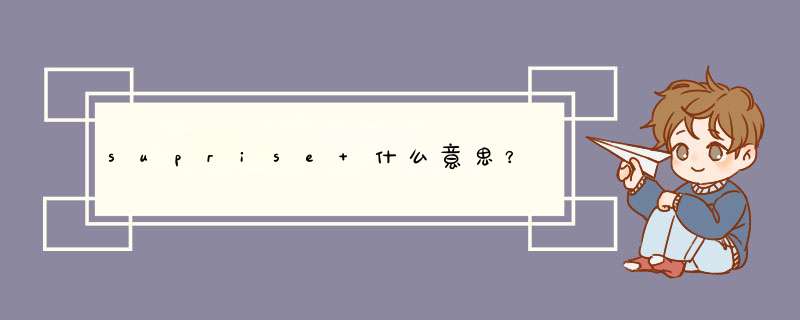
n 惊讶; 惊奇
v 使 惊讶
读音:英 [sʌp'raɪz] 美 [sʌp'raɪz]
例句:
1、用作名词 (n)
The child looked at me in suprise
孩子惊讶地望着我。
To my suprise this was the only bottle that didnt leak and didnt hold a lot of air
惊讶的是,这个是我用到现在唯一不漏的奶瓶而且不会有很多空气在里面。
2、用作动词 (v)
The child looked at me in suprise
孩子惊讶地望着我。
To my suprise this was the only bottle that didnt leak and didnt hold a lot of air
惊讶的是,这个是我用到现在唯一不漏的奶瓶而且不会有很多空气在里面。
扩展资料:
surprise用法
1、surprise是及物动词,其宾语常是人称代词。接名词、代词或以现在分词充当补足语的复合宾语。
2、surprise后接介词at表示“对…感到惊讶”; 后接介词from表示“出其不意使…说了”; 后接介词
into表示“出其不意地使人…”; 后接介词with表示“以…使(某人)惊奇”。
3、surprise的现在分词和过去分词都可用作形容词,在句中作表语或定语。
(1)surprise的现在分词作表语时含主动意义,主语一般是物。常采用以it作形式主语的结构,其真正主语由that引出。
(2)surprise的过去分词作表语时含被动意义,主语一般是人,后接由介词at引导的短语、动词不定式或that/wh-从句,表示“对…感到惊奇”。
4、surprise表示“惊奇,惊讶”,用作不可数名词; 表示“令人吃惊的事物”,用作可数名词。
5、surprise在句中还可用作定语。
惊喜的英文:pleasant surprise
惊喜;愉快的惊奇
一、pleasant
英 [ˈpleznt] 美 [ˈplɛzənt]
adj令人愉快的;可爱的;有趣的;晴朗的
二、surprise
英 [səˈpraɪz] 美 [sərˈpraɪz]
vt使惊奇;突袭;意外发现
n惊喜,惊奇;意外的事
1、I do love pleasant surprise!
我太很喜欢意外的惊喜了!
2、Can you imagine there being a big pleasant surprise for you
你能想象有一个大的惊喜等着你吗?
扩展资料
同义词辨析:surprise、startle、amaze、astonish
1、surprise 指使惊奇、使诧异、使感到意外:
The outcome didn't surprise me at all
这一结果完全在我的意料之中。
2、startle 指惊吓、使吓一跳、使大吃一惊:
Sorry, I didn't mean to startle you
对不起,我不是存心要吓唬你。
3、amaze 指使惊奇、使惊愕、使惊诧:
Just the huge size of the place amazed her
仅仅地方之大就使她十分惊奇。
4、astonish 指使十分惊讶、使大为惊奇:
The news astonished everyone
这消息使大家十分惊讶。
be surprised at 对……感到惊奇
表示某种情绪、心情的起因时,常用at…这一介词短语,表示“听到…”或“看到…”而…
We were surprised at his arrival(到达)
欢迎分享,转载请注明来源:表白网

 微信扫一扫
微信扫一扫
 支付宝扫一扫
支付宝扫一扫
评论列表(0条)